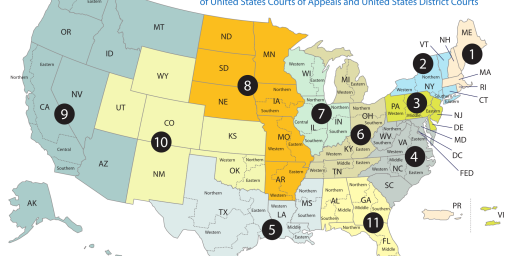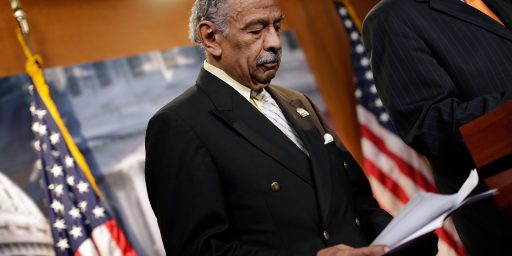Obama Administration Petitions Supreme Court To Review 11th Circuit Ruling On ObamaCare
The health care battle is formally joined in the Supreme Court.
As expected, the Justice Department yesterday formally asked the Supreme Court to review the 11th Circuit Court of Appeals decision striking down the Affordable Care Act’s individual mandate as unconstitutional:
The Obama administration moved aggressively Wednesday for Supreme Court review of the 2010 health-care act, making it likely a constitutional ruling on the president’s signature and most controversial domestic achievement will come in the thick of the presidential campaign.
The administration said it was confident the act would be upheld as a valid exercise of federal power, just as Social Security and the Civil Rights Act were. If the court agrees to hear the case in the term that begins Monday, it would almost certainly render its decision by the end of deliberations in June.
The administration called upon the justices to review the decision of a three-judge panel of the U.S. Court of Appeals for the 11th Circuit in Atlanta, which is the only appeals court to say Congress exceeded its power in passing the law. The law requires almost every American to have health insurance.
“Throughout history, there have been similar challenges to other landmark legislation such as the Social Security Act, the Civil Rights Act, and the Voting Rights Act, and all of those challenges failed,” the Justice Department said in a statement. “We believe the challenges to the Affordable Care Act — like the one in the 11th Circuit — will also ultimately fail and that the Supreme Court will uphold the law.”
The law, enacted when Democrats controlled both chambers of Congress, has roiled national politics and prompted calls for repeal from the Republican presidential candidates running to replace Obama.
The political consequences of whether it is better or worse for Obama’s reelection chances to have the case decided before the election have been debated with little consensus. But the administration put aside options that could have created a delay, and its petition Wednesday ensures a quicker decision by the court.
A Justice Department official authorized to speak only on background said a consensus existed within the department that there is much to do on behalf of the federal government, states and the private sector to implement the act by 2014 and that a final decision by the court was needed.
The historic split the law has provoked is evidenced by the very lawsuit at hand: It was brought by 26 objecting states.
“It represents an unprecedented challenge — involving over half the states in the nation — to an unprecedented legislative initiative,” Paul D. Clement, solicitor general under President George W. Bush, wrote in a petition to the court on behalf of the states.
As I noted earlier this week, the legal calculus in this matter is complicated, but so is the political calculus. And, as Dahlia Lithwick reminds us this morning, that political calculus will be played out in the Supreme Court just as much as it has been in the halls of the West Wing:
I remain unsure that there just are five justices at the high court eager to have the court itself become an election-year issue. I don’t think Chief Justice John Roberts wants to borrow that kind of partisan trouble again so soon after Citizens United, the campaign-finance case that turned into an Obama talking point. And I am not certain that the short-term gain of striking down some or part of the ACA (embarrassing President Obama even to the point of affecting the election) is the kind of judicial end-game this court really cares about. Certainly there are one or two justices who might see striking down the ACA as a historic blow for freedom. But the long game at the court is measured in decades of slow doctrinal progress—as witnessed in the fight over handguns and the Second Amendment—and not in reviving the stalled federalism revolution just to score a point.
As I’ve noted before, and as Lyle Denniston points out in an article over at SCOTUSBlog, there are many ways that the Court could delay a ruling on the merits here, the most interesting of them being the route suggested by the Fourth Circuit in its ruling last month in Liberty University v. Geithner. In that case, the Court ruled that the individual Plaintiffs were barred from challenging the mandate under the Anti-Injunction Act, which prohibits a party from challenging a tax until that tax has actually been imposed. In this case, that would mean that the mandate could not be challenged until after it had gone into effect and someone had been fined for refusing to obtain insurance coverage. Practically speaking, that means that a challenge to ObamaCare might not be ripe for Supreme Court review until 2015 at the earliest, and most likely later than that. The Justice Department specifically cited the 4th Circuit’s ruling in Liberty University, and the conflict that now exists on this issue between the Circuits, as a reason that the Court should take this appeal.
However this turns out, it will be the most watched Supreme Court case in decades and may lead to yet another petition to the Court by the media to broadcast the proceedings live. That petition will be denied, of course, but what we’re likely to see is the same kind of simultaneous release of the audio recordings of the oral arguments that we did when the Court heard the District of Columbia v. Heller gun control case.
For those interested, here are links to the Certiorari Petitions filed yesterday with the Supreme Court:







Yeah well that’s an extremely misleading statement. Charachterizing rogue AG’s as States is just factually incorrect. If you have to rely on factually incorrect statements to make your argument…it’s just not a valid argument.
Beyond that…pretty aggressive move by a President that just yesterday the wetdream candidate of the so-called republicans was calling the By-Stander in Chief.
@Hey Norm:
What Gregoire forgets is that AG is an independent elected position so, you know, he doesn’t necessarily have to consult with her in making a decision about legal matters.
Just ask the Republican Governor of Georgia who was upset that the Democratic AG decided not to join the multi-state suit.
@Hey Norm: And like it or not, state attorneys general do get to speak in the name of the states. They actually have that authority.
I understand all that…but to say that 26 states have joined in the lawsuit is just misleading. The Governor and the Legislature of Washington is against the suit.
26 AG’s, who may or may not have political ambitions and axes to grind, have joined in the suit.
@Hey Norm: Meanwhile, 24 state Attorneys General, who may or may not have political ambitions and axes to grind, have chosen to not join in the suit — sometimes in direct defiance of their state’s governor.
That sound about right to you?
J.
That’s fine…but it only supports my position.
I don’t hang out with the Justices as much as Lithwick, but I do not sense any reticence in this court to involve themselves in high-profile issues.
Most of this Court decided the Presidency in 2000; since then we’ve had landmark cases of public interest on Second Amendment rights, the laws of detention in War, and eminent domain. (These cases are far more important than Citizens United)
What I do sense is a desire to keep the footprint as small as possible in these cases. In Gore v. Bush, the Court announced the decision had no future precedent. In Heller, Scalia went out his way to identify several types of gun regulations that are permissible. On the day Boumediene v. Bush was announced, the Court denied habeas relief to a detainee being transferred to Iraq where he might be tortured. In Citizens United, the majority pointed out that constitutional laws could be passed to deal with concerns over foreign money.
So, I predict continuity, the Court will accept the case and if they overturn the mandate it will be on the narrowest grounds possible.
@Hey Norm: That’s fine…but it only supports my position.
Well, that shows either I failed or you did, as it was intended to counter your implication that only one side might have been motivated by politics. That’s just plain lazy thinking, and a common failing among the hyper-partisan: my side is good and they’re evil, so I don’t even have to try to understand their arguments or positions or principles.
J.
@Jay Tea:
Heh.